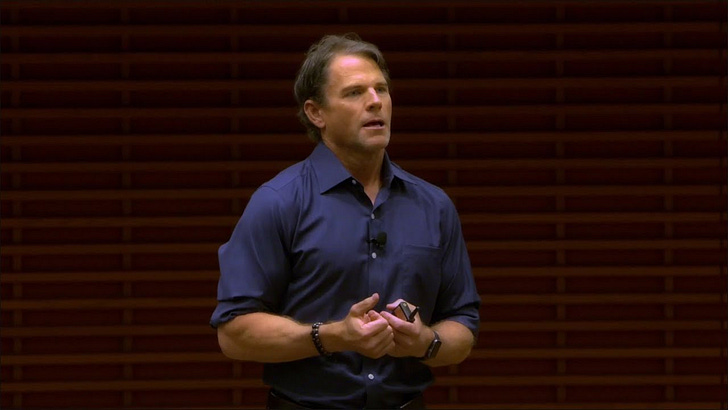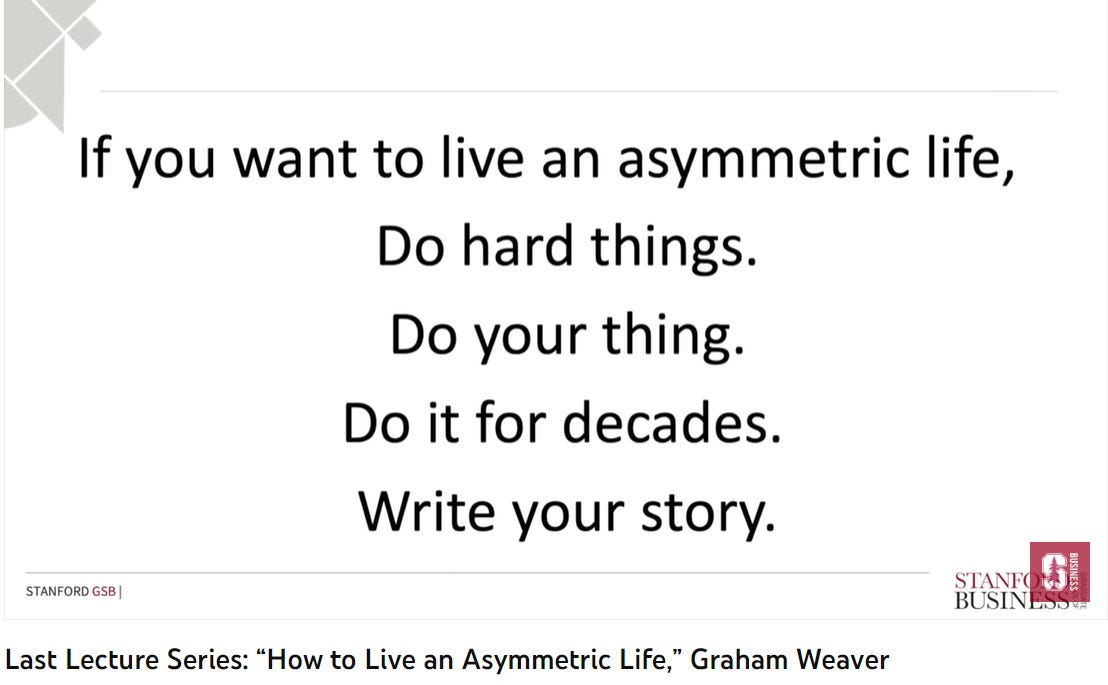Asymmetric Life
Explorando el Crecimiento Personal y Profesional a través de una selección de lecturas y videos de visionarios, emprendedores, pensadores y expertos con ideas y perspectivas sobre filosofía de vida, con el objetivo de impulsar el crecimiento personal, profesional y nuestra resiliencia mental.
Para vivir una vida de crecimiento asimétrico es necesario reconocer que no debemos jugar a la defensiva, no hay camino fácil y que puedes fracasar en algo que ni te gusta, así que es mejor tomar la oportunidad de hacer lo que te apasione. Vivir sin miedo desafiar lo convencional y abrazar el cambio como motor de desarrollo.
Los retornos asimétricos describen la variación que puede haber entre la magnitud de los rendimientos positivos y negativos.
Una asimetría positiva es cuando el potencial rendimiento positivo es significativamente mayor que el posible resultado negativo. En otras palabras, hay más probabilidad de obtener grandes retornos que pérdidas significativas.
Stanford 2023 Last Lecture Series: “How to Live an Asymmetric Life” Graham Weaver
Do hard things. Do your thing. Do it for decades. Write your story.
“If the only purpose of investing is trying not to lose money, you will be pushed to play it small. No matter what you do, there is always downside. Same applies to life”
“It is misleading to think that comfort will make life easy and better. Life is suffering. So figure out something worth suffering for”
“When faced with choices about what we want to do, most of us miss one important piece of the equation. We factor in all the risks and tradeoffs, but we completely discount how differently we will show up when we’re truly energized about something.”
“No matter where you are in your life right now, you can write a new story.”
“Fear is a master manipulator. It will disguise itself as helping you, as being practical, as keeping you safe. And ultimately, fear will disguise itself as “not me” and “not now.”
“Play for the upside for an assymetric life. Never say not me, not now”
Jeff Bezos Princeton University 2010 Baccalaureate address
Life choices and using our gifts. Living in exponential times. Relentless.
"Cleverness is a gift; kindness is a choice."
"Tomorrow, your life—the life you author from scratch on your own—begins."
"The best way to think about it is this: if you can project yourself forward to age 80 and think, 'What will I think at that time?' it gets you away from some of the daily pieces of confusion."
"We are our choices."
Jim Carrey at MIU 2014 Commencement Address
Embrace Fear and Take Risks, Find the Courage to Pursue Your Dreams, Embrace the Power of Intention, Live in the Present Moment, Use Failures as Stepping Stones
“You can fail at what you don't want, so you might as well take a chance on doing what you love."
"Your need for acceptance can make you invisible in this world. Don't let anything stand in the way of the light that shines through this form. Risk being seen in all of your glory."
"Life opens up opportunities to you, and you either take them or you stay afraid of taking them."
"I believe that everything happens for a reason. People change so that you can learn to let go, things go wrong so that you appreciate them when they're right, you believe lies so you eventually learn to trust no one but yourself, and sometimes good things fall apart so better things can fall together."
Steve Jobs' 2005 Stanford Commencement Address
“Stay Hungry, Stay Foolish”
Mary Schmich essay written in 1997 with some amazing advice for life
“Accept certain inalienable truths: Prices will rise. Politicians will philander. You, too, will get old. And when you do, you'll fantasize that when you were young, prices were reasonable, politicians were noble, and children respected their elders."
“People will forget what you said, people will forget what you did, but people will never forget how you made them feel.” ― Maya Angelou
“Tibetan Buddhist texts liken this type of addictive behavior to ‘licking honey off a razor.’ The initial sensation may be sweet, but the underlying effect is quite damaging. Seeking satisfaction in others or in external objects or events reinforces a deep and often unacknowledged belief that we, as we are, are not entirely complete; that we need something beyond ourselves in order to experience a sense of wholeness or security or stability.”
— Joyful Wisdom by Yongey Mingyur Rinpoche





